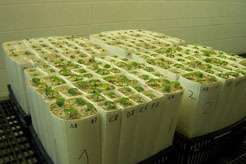Plants prefer their kin, crowd out competition from strangers

(PhysOrg.com) -- Plants don't mind sharing space with their kin but when they're potted with strangers of the same species they start invigorating their leaves, a study by McMaster University reveals.
The research, which appears in the current issue of the American Journal of Botany, suggests non-kin plants will not only compete underground for soil nutrients, but will attempt to muscle out the competition above ground in the ongoing struggle for light.
It follows previous research from McMaster University which found that plants can recognize their kin through root systems and will compete more strongly for soil nutrients and water with non-sibling plants.
"This is the first study that shows plants are responding to kin at the above ground level," explains Guillermo Murphy, lead author of the study and a graduate student in the Department of Biology at McMaster University. "When they recognize their kin, they grow differently in shape, taller, with more branches and fewer resources into leaves, therefore allowing their siblings to access precious sunlight."
When researchers planted seedlings of a North American species of shade-loving Impatiens in the same pot, they reacted mildly with other offspring from the same mother plant. But when planted among non-kin of the same species, the plants shift extra resources into growing leaves.
"This supports previous research that plants are capable of complex social behaviour and will exhibit altruistic behaviour, giving their siblings a competitive edge in the wild," says Murphy.
In a previous study, led by Susan Dudley, associate professor of biology at McMaster, the Great Lakes sea rocket or Cakile edentula, which flourishes on beaches, showed altruistic behavior among its kin at the root level. When nearby strangers were detected, the sea rocket shifted resources to roots, fighting for precious water and soil nutrients.
This all makes sense on an ecological level, says Murphy. Sea rockets would have easy access to sunlight in its natural beach habitat and therefore, would struggle for nutrients underground. Conversely, Impatiens thrive in the shady woodlands, where moisture is plentiful, but sunlight is scarce.
The roots seem to tell siblings from strangers, he says, whether the change in behaviour is above or below ground. But simply placing them beside one another, in separate pots, did not produce the same results.
In the lab, researchers germinated the seeds from Impatiens collected in the field, to ensure they were properly grouped by sibling and non-siblings.
Source: McMaster University (news : web)


















